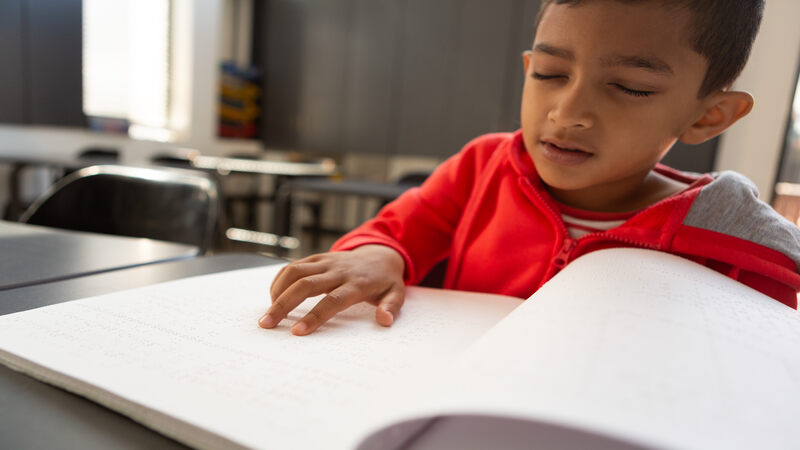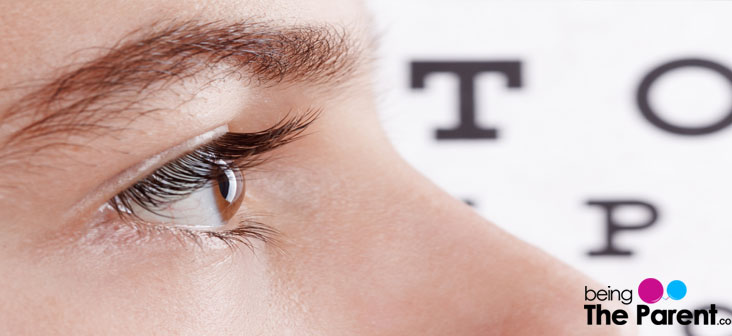
As a kid, playing a blindfold game is fun but for a short period of time. Our eyes are not just windows to our soul but they also help us to see and understand the world outside. It is one of the miraculous gifts of gods and we have to cherish it lifelong. But what if your child has to get adjusted and learn to live without his sight? Evaluating the child’s visual abilities is extremely significant. If your child does not appear to react to light and moving stuff it could be an indication of childhood blindness. Continue reading to find out more about the causes, symptoms and treatment choices for childhood blindness.
Blindness in children
It is a shocking fact that the number of children who experience the ill effects of visual impairment worldwide is around 1.4 million. Do you know that 75% of the world’s visually impaired kids live in Africa and Asia? “VISION 2020, The Right To Sight – India” started in 1999, is a national movement for eliminating avoidable blindness by the year 2020. It is working along with WHO (World Health Organization) and IAPB (International Agency for the Prevention of Blindness). Its ultimate goal is to free the world from avoidable blindness and visual impairment.
How Does Your Child See?
Eye, an important organ of the visual system consists of numerous sensitive parts like the retina, cornea, lens, iris, optic nerve etc. All these parts have to work collectively and focus on light and images. Unique nerves from the eyes carry signals to the brain. The brain processes and recognizes what the child sees. All these need to happen together for the child to be able to see.
When these don’t function the way they ought to, the child may have issues with his vision or in worst scenario may also face blindness. Blindness does not necessarily mean complete darkness. Mostly, children who are visually impaired can see some light or shadows.
Causes Of Blindness In Children
Some babies are born blind or with severe vision loss. There can be various reasons for this condition, like:
- In babies who born prematurely and require oxygen treatment, blindness can occur. Since the brain was deprived of oxygen for some time, vision loss can happen due to the damage to brain cells that control vision
- Bleeding in the brain
- Vitamin A deficiency is a significant cause of preventable childhood blindness
- Improper development or undeveloped optic nerve which is the nerve that carries signals from the eyes to the brain
- Blindness can be heredity i.e. it can be genetically passed from the parents to their child
- Accidents can also cause blindness when some foreign object may hurt the eye
- If the mother experiences some serious infections like rubella, toxoplasmosis etc. and some sexually transmitted infections like herpes
- If the child experience issues with the central nervous system such as cerebral palsy
- Congenital cataract is one of the most significant treatable causes of childhood blindness
- If the child has diabetes, it can lead to complications in the eyes like diabetic retinopathy which can cause vision impairment

Symptoms Of Blindness In Children
Since the child is too small to express or explain, it is important for the mother to watch out for the following signs that indicate issues with vision. Watch out for these signs and symptoms because early detection increases the success rate of treatment.
- Eyes that are not focusing
- The child tends to swing the eyes side to side and up and down
- Unevenly sized pupils
- If the child doesn’t move his or her eyes if you move some object in front of the child
- If the child always bumps into objects or knock over the things
- If the child always shows a tendency to avoid tasks that require good vision
- Having one or both eyes turned inward toward the nose
- If instead of black, the pupil appears white
- If the eyes are overly bulged out or sunken in
- Repeated shutting of eyes
- If the child sits too close to the television or holds a book too close to his face
Treating Blindness In Children
If the child shows any of the above signs or symptoms, it indicates the child has some serious issues with his vision. It is advisable that you make an appointment with an ophthalmologist and get your child examined immediately. Remember, early detection of the cause of vision impairment will ensure proper treatment. The doctor may resort any of the following treatment options depending on the cause:
- The doctor will perform eye test to detect the problem
- The doctor may suggest glasses or contact lenses in certain cases to your child to correct the problem
- Surgical interventions can be an option for some causes
- In cases where nutritional deficiency is the cause, ensuring a proper diet for your child will help correct the vision
- Ayurveda also provides some treatment methods which strengthens the nerves and help in regaining vision, if the blindness is due to the damage of the optic nerve
Raising A Visually Impaired Child
If the child is experiencing total blindness instead of partial blindness, the recovery chances are very low. Giving your child proper care and eventually helping him to self-manage and lead a life close to normal depends on the attitude of the parents. Support him. Encourage him. Find out his talent and nurture it. Make him feel strong and confident. Keep yourself updated on the educational options and help him learn Braille. Find out the schools and institutions that help the child to cope up with the situation.
Always stay updated on modern medical development. You never know when some inventions or improvements in the field of science come out as an answer to your prayers. Always motivate your child. Make him strong enough to face the world alone.
If you have any experience to share on this, please feel free to write it in the comments section below.
